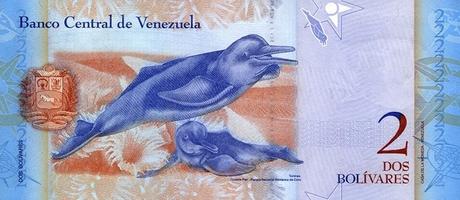 The currency of
Venezuela is ‘ bolívar fuerte (sign: Bs.F.’ since Jan 2008. It is subdivided into 100
céntimos and replaced the original bolivar.
The bolívar was adopted by the monetary law of 1879, replacing the
short-lived venezolano at a rate of five bolívares to one venezolano.
Initially, the bolívar was defined on the silver standard, equal to 4.5g fine
silver, following the principles of the Latin Monetary Union. The monetary law
of 1887 made the gold bolívar unlimited legal tender, and the gold standard
came into full operation in 1910. Venezuela went off gold in 1930. Until 18 February 1983 (now called Black
Friday) by many Venezuelans, the bolívar had been the region's most stable and
internationally accepted currency. It then fell prey to high devaluation.
Exchange controls were imposed on February 5, 2003 to limit capital flight.
Now
comes the news that Venezuela is creating a digital currency to combat a
financial blockade by the United States, President Nicolas Maduro has
announced. It will be called the Petro and be backed up by Venezuela's reserves
of oil and gas and its gold and diamond holdings, the president said in his
weekly television program. "This is going to allow us to move toward new
forms of international financing for the country's economic and social
development," the president said yesterday.
The
news comes as Venezuela faces acute financing problems after creditors and
ratings agencies declared the government and the state run oil firm PDVSA to be
in partial default for missing interest and principle payments on bonds. Maduro
blames those problems on sanctions imposed by the United States in August,
barring American citizens and companies from buying any new Venezuelan
government or PDVSA bonds.
Venezuela
is mired in a deep economic crisis triggered mainly by a fall in crude oil
prices and a drop in oil production. Petroleum is its main source of hard
currency. Over the past year, the Venezuelan bolivar has plummeted 95.5 per
cent against the dollar on the black market.
The currency of
Venezuela is ‘ bolívar fuerte (sign: Bs.F.’ since Jan 2008. It is subdivided into 100
céntimos and replaced the original bolivar.
The bolívar was adopted by the monetary law of 1879, replacing the
short-lived venezolano at a rate of five bolívares to one venezolano.
Initially, the bolívar was defined on the silver standard, equal to 4.5g fine
silver, following the principles of the Latin Monetary Union. The monetary law
of 1887 made the gold bolívar unlimited legal tender, and the gold standard
came into full operation in 1910. Venezuela went off gold in 1930. Until 18 February 1983 (now called Black
Friday) by many Venezuelans, the bolívar had been the region's most stable and
internationally accepted currency. It then fell prey to high devaluation.
Exchange controls were imposed on February 5, 2003 to limit capital flight.
Now
comes the news that Venezuela is creating a digital currency to combat a
financial blockade by the United States, President Nicolas Maduro has
announced. It will be called the Petro and be backed up by Venezuela's reserves
of oil and gas and its gold and diamond holdings, the president said in his
weekly television program. "This is going to allow us to move toward new
forms of international financing for the country's economic and social
development," the president said yesterday.
The
news comes as Venezuela faces acute financing problems after creditors and
ratings agencies declared the government and the state run oil firm PDVSA to be
in partial default for missing interest and principle payments on bonds. Maduro
blames those problems on sanctions imposed by the United States in August,
barring American citizens and companies from buying any new Venezuelan
government or PDVSA bonds.
Venezuela
is mired in a deep economic crisis triggered mainly by a fall in crude oil
prices and a drop in oil production. Petroleum is its main source of hard
currency. Over the past year, the Venezuelan bolivar has plummeted 95.5 per
cent against the dollar on the black market.
So whether digitalisation of currency can bring in benefits remains to be seen ! With regards – S. Sampathkumar
4th Dec 2017.

